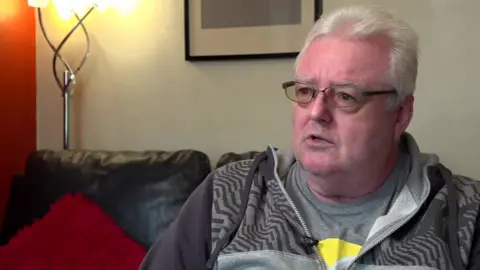Scottish Power boss urges £1,000 bill cut for 10 million
 Getty Images
Getty ImagesThe boss of Scottish Power has warned that millions of customers face an horrific winter unless there is a major government intervention in energy firms.
Keith Anderson, chief executive of Scottish Power, told the BBC that another expected rise in energy bills in October to between £2,500 and £3,000 a year could see huge losses for suppliers and many customers unable to pay their bills.
He warned regulator Ofgem that setting the new price cap too low could risk suppliers collapsing or the foreign owned firms leaving the market.
Chancellor Rishi Sunak told the BBC: "Where we can make a difference, particularly for those who really need our help, that's what we're going to do."
Mr Anderson has put some flesh on the bones of a plan he first mentioned in a frank exchange with a committee of MPs three weeks ago.
He has called for ten million households to have their energy bills reduced by £1,000 this October.
He said the government's plan to give each household £200 towards their energy bill - a sum that will need to be paid back - would not be enough.
"We need to be realistic about the gravity of the situation - around 40% of UK households, potentially 10 million homes, could be in fuel poverty this winter," Mr Anderson explained.
'Tariff reduction'
The price cap is set to be increased again in October.
To date, the government has said it will offer extra relief of £150 in April via the council tax system in England, and in October customers in England, Scotland and Wales will receive a £200 rebate on their energy bills.
They will have to repay this at £40 a year for five years, starting in April 2023.
However, Mr Anderson said a £10bn tariff reduction fund could be paid for by adding £40 annually to all household energy bills for the next decade. He said this would be the most effective to avoid fuel poverty for the most vulnerable.
Mr Anderson said that such a fund would directly tackle the biggest cause of the cost of living crisis in a way that other measures - such as the recent 5p cut to fuel duty or a possible cut to the frequency of MOT testing - do not.
Households on pre-payment meters and those in receipt of benefits would be eligible for the discount.

Gerard Barwick lives in Newcastle with his partner and their granddaughter. He's a DJ, but lost his business during the pandemic.
At the moment they're relying on a single wage to pay their bills, and April has been particularly tough.
"We used to be able to afford the odd night out. Now we can't afford to do anything," said Mr Barwick, who is receiving help from the charity National Energy Action.
"We've cut back on putting the heating on, we're not using as much electricity, we're cutting back on meals. But there's only so much you can cut back on," he said.
"We're really worried about our bills right now. Come October, we might have to find another £1,000.
"We're already looking at an empty purse, and you can't pull any more money out of an empty purse," he said.
Warning to Ofgem
Mr Anderson also said more energy companies could collapse if their customers were unable to pay their bills.
Scottish Power is owned by Spanish firm Iberdrola and Mr Anderson fears that foreign owned energy suppliers - including EDF, Eon and his own - might struggle to persuade their parent companies to continue to subsidise loss-making UK subsidiaries and exit the UK market.
Scottish Power is also concerned that energy companies will sustain further big losses if Ofgem sets the new energy price cap - due to take effect in October - too low.
Wholesale gas prices have fallen sharply since the all time records set in March.
However, many energy companies bought the gas they will supply this winter at prices much higher than current levels.
If Ofgem does not recognise this when it sets the new cap, some firms will have to sell at a significant loss threatening them with further distress or collapse which would further destabilise the market, according to Scottish Power.
"We need to find a way to help those that need it in time for winter in a way that doesn't exacerbate the issues we've already seen in the industry with supplier failures and very real concerns about billpayers running up unsustainable debts," Mr Anderson continued.
Energy suppliers concede that further government support would help them as well as their customers.
Meanwhile, government officials privately say that it is hard to distinguish between genuine potential financial distress for the energy companies and intense lobbying.
Ofgem responded that it is "too soon" to predict the level of the price cap from October. However, it said that new measures earlier this year will allow it in "exceptional circumstances", to update the price cap more frequently than once every six months, to "ensure that the price cap continues to reflect the true cost of supplying energy".
Chancellor Rishi Sunak said people will have to wait until the autumn for any further help with their energy bills.
Speaking at an event promoting small businesses in Norwich, Mr Sunak told the BBC the government "stands ready to do more as the situation requires it" but said the Treasury would need to wait for "better clarity on what energy prices will be in the autumn".
